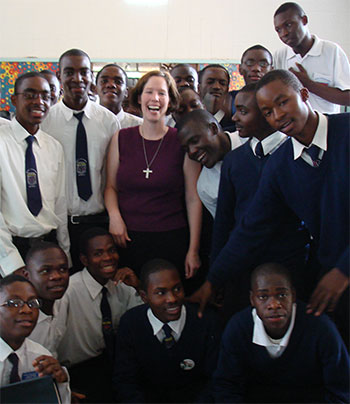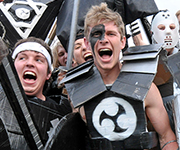Beyond Borders
by Sara Veldhuizen Stealy ’98

I recall the first time I got the question. I was in a small classroom in Lusaka, not long after I had arrived in Zambia for my first tour as a U.S. Foreign Service officer. He was probably 15 years old, with close-cropped hair and dressed in a white, short-sleeved oxford shirt with light gray stripes. He wasn’t defiant or angry. He was just curious.
“I heard the United States created HIV on purpose. Is that true?”
The same scene happens dozens, if not hundreds of times a week around the world: A U.S. diplomat meets with a group of students or religious leaders, perhaps entrepreneurs or artists. Of course, sometimes the audience is familiar with America. They know Americans. Maybe they’ve even traveled to the United States.
But so many times, this is their first conversation with an American. They’ve seen movies and television. They have ideas about America. But they’ve never had the chance to look an American in the eye and ask about our lives, our policies, our beliefs. Maybe they just want to know about your house or your dog. Or maybe there’s a larger question, something they heard somewhere once.
I lost track of how many times I was asked the HIV question. But I do remember the feeling each time of wanting to make eye contact with the questioner, to discover why he thought that might be true. I believed—hoped—that once we talked it through, face to face, he would walk away with the truth and a different, more positive impression of America.
And that’s the thing about diplomacy: There’s this image of it, of diplomats in a foreign ministry somewhere, flags on the table, a checklist of policy points to negotiate. We do that, too, sometimes. But more often, it’s person to person. It’s that “last three feet” that Edward R. Murrow so famously referred to.
Diplomacy is being out there. It’s opening yourself up to those questions from students. It’s having coffee with a journalist to learn more about a divisive political issue. It’s marching in a parade, surrounded by riot police, to show that the United States supports equal rights for all people. Diplomacy is visiting a rural clinic to see how a U.S. government program has improved the child mortality rate, touring an industrial zone to explore ways to expand our trade relationship, and comforting an American citizen in the hospital.
It is being out there—especially for my colleagues in dangerous places. And we’ve seen this year just how dangerous it can be. More and more frequently, diplomats serve in countries where anti-American sentiment is high and the threat of terrorism is very real. In other countries, they face civil unrest, unfamiliar diseases and substandard medical care.
I didn’t know Ambassador Chris Stevens or the other Americans killed in the line of duty this year, but several of my colleagues did. They lost a friend, a boss or a mentor. It has been a difficult year. I’d be lying if I said it doesn’t make me stop, just for a moment, to consider why we do what we do—why we keep going out there when there’s so much conflict. And then I remember: We keep going out there because there’s so much conflict—because we believe by connecting with others, by creating closer ties, we can play a role in changing that.
We believe in what America stands for. We believe America has a good story to tell. And we believe America must continue to be, as Secretary of State Hillary Clinton said, “the greatest force for peace, progress and human dignity the world has ever known.”
That cannot be done from inside any embassy in the world. So out we go. We go out, regardless of where “out there” may be, in the hope that by the end of the day, the people we meet will have a better understanding of America.
That’s what we do.
Sara Veldhuizen Stealy is a political officer at the U.S. Embassy in Riga, Latvia. She previously served as a consular officer in Riga and as the deputy public affairs officer at U.S. Embassy Zambia. The views expressed are Stealy’s and not necessarily those of the Department of State or the U.S. government.
 Social entrepreneurs invest in society, but not at the expense of making money.
Social entrepreneurs invest in society, but not at the expense of making money. Jim Ellis has been running across Iowa since January, inspiring young and old alike to pursue their passions with vigor.
Jim Ellis has been running across Iowa since January, inspiring young and old alike to pursue their passions with vigor. Dorm Traditions build bonds, forge friendships and make memories.
Dorm Traditions build bonds, forge friendships and make memories.
Classic Comments
All comments are moderated and need approval from the moderator before they are posted. Comments that include profanity, or personal attacks, or antisocial behavior such as "spamming" or other inappropriate comments or material will be removed from the site. We will take steps to block users who violate any of our terms of use. You are fully responsible for the content that you post. Comments posted do not reflect the views or values of Northwestern College.